

7 Essential ESA Laws Michigan Pet Owners Must Know
by Lena Park
Last updated: July 9, 2025
Verified and Approved by:
Angela Morris,
MSW, LCSW
Fact Checked

Overview
This article highlights the essential laws concerning Emotional Support Animals (ESAs) that Michigan pet owners need to understand to navigate their housing and legal rights with confidence. Many individuals face emotional challenges that can feel overwhelming, and having an ESA can be a source of comfort and support.
The Fair Housing Act plays a crucial role in protecting ESA owners from discrimination, ensuring that they receive reasonable accommodations. It’s important to have valid ESA letters from licensed professionals, as these letters are vital in upholding your rights in housing situations.
Remember, you are not alone on this journey; support is available to help you through these challenges.
Introduction
Navigating the complexities of Emotional Support Animal (ESA) laws in Michigan can be a daunting journey for pet owners facing the challenges of mental health. As awareness grows regarding the therapeutic benefits these beloved companions offer, the legal landscape surrounding ESAs becomes ever more significant. This article seeks to illuminate the essential laws and regulations that Michigan pet owners should be mindful of, providing insights into their rights and responsibilities.
Yet, despite the evolving legal protections, many individuals still encounter obstacles in securing housing and accessing public spaces with their ESAs. What steps can you take to ensure that your emotional support companion is recognized and accommodated in a world that often misinterprets their vital role? Together, we can explore the supportive solutions available to you.
Wellness Wag: Streamlined ESA Letter Services for Michigan Residents
At Wellness Wag, we understand the emotional challenges that many Michigan residents face. The journey towards mental well-being can often feel overwhelming, especially when navigating housing restrictions due to these struggles. That’s why we offer a user-friendly platform to help you obtain your Emotional Support Animal (ESA) letter, following the ESA laws Michigan, which is a compassionate solution designed to support you during this difficult time.
The process begins with a brief assessment to determine your eligibility, allowing you to share your specific emotional support needs. We know that every individual’s situation is unique, and it’s important for you to feel heard and understood. Following this assessment, you will be connected with licensed medical professionals who are ready to provide personalized consultations. This step ensures that you receive the tailored support you deserve.
Once you place your order, you will receive a confirmation email detailing your purchase, bringing you one step closer to the support you need. After approval, you can expect to receive your official ESA letter within 24 hours. This timely response is designed to empower you, helping you advocate for your rights under the ESA laws Michigan and the Fair Housing Act.
We invite you to take our quick assessment today and begin your journey towards obtaining your ESA letter. Remember, you are not alone in this; compassionate support is just a step away, and we are here to help you every step of the way.
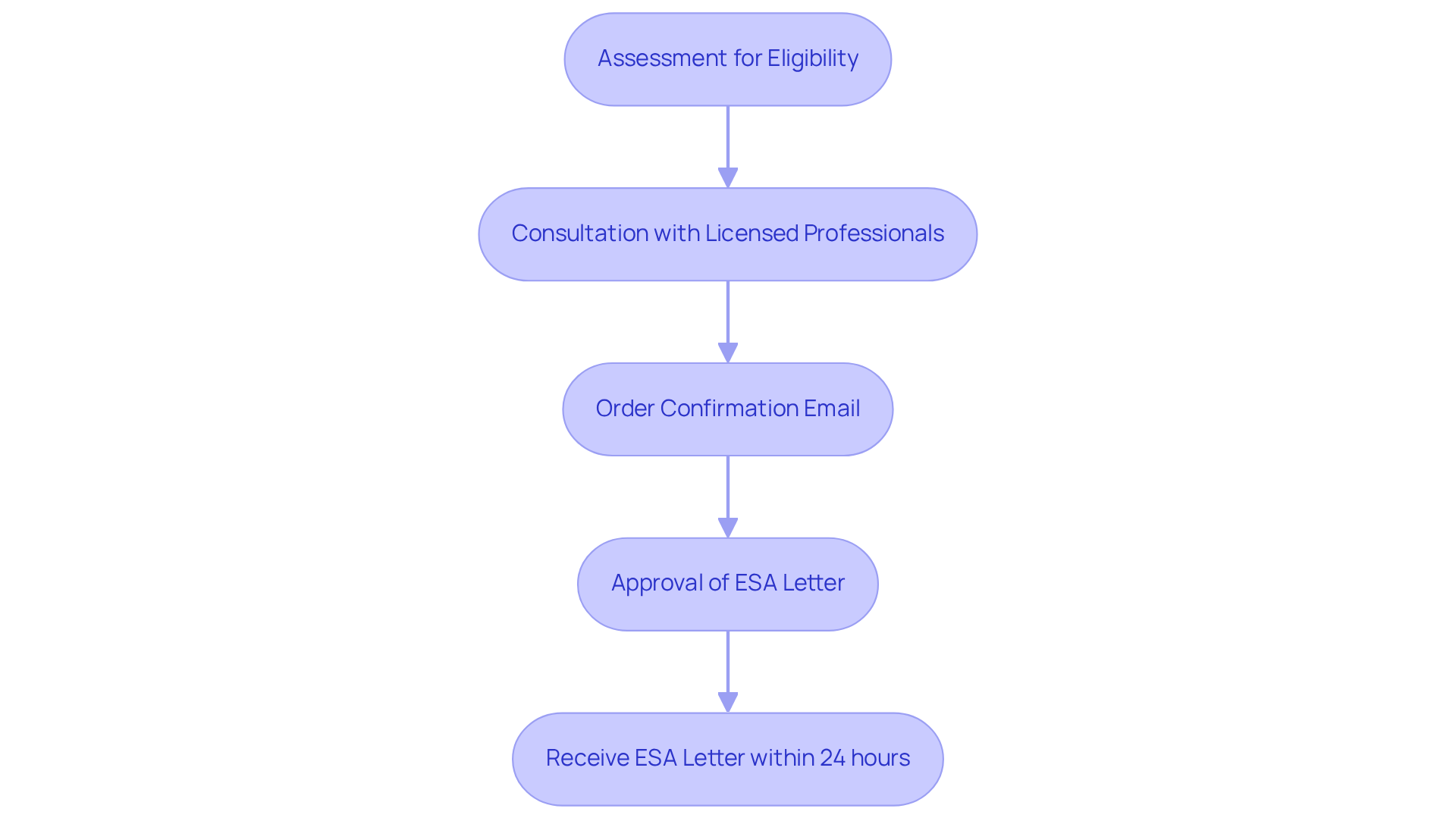
Fair Housing Act: Protections for Emotional Support Animals in Housing
The Fair Housing Act (FHA) serves as a vital legal protection against discrimination for individuals with disabilities, including those who rely on Emotional Support Animals (ESAs). This important legislation requires landlords to provide reasonable accommodations for tenants who present valid ESA letters, allowing them to live with their animals even in properties where pets are typically not allowed. Such protections are crucial for individuals facing mental health challenges, as they enable the continuation of essential emotional support systems without the fear of housing discrimination.
In Michigan, the landscape of housing discrimination regarding emotional support animals has undergone significant changes due to esa laws Michigan. Recent statistics indicate that a notable percentage of landlords are now accommodating emotional support animals, which is in accordance with esa laws michigan, reflecting a growing awareness of their legal obligations under the FHA. For example, a survey found that approximately 70% of landlords in Michigan expressed a willingness to accept tenants with ESA laws Michigan, provided they have the necessary documentation.
Successful housing accommodations for ESA owners often depend on clear communication and proper documentation. Tenants who have effectively presented their ESA letters have successfully secured housing in previously restrictive environments, showcasing the FHA’s role in facilitating these important arrangements. However, challenges persist, as recent cases of housing discrimination against ESA owners reveal ongoing issues within the rental market. In 2021, there was a reported increase in grievances related to ESA discrimination, underscoring the need for continued advocacy and education about tenant entitlements.
Legal experts emphasize that understanding one’s entitlements under the FHA is essential for ESA owners. They advise renters to be proactive in disclosing their emotional support animals to property owners and ensuring that all required paperwork is in order to prevent potential lease infringements. This proactive approach not only protects the interests of ESA owners but also fosters a more inclusive housing environment.
Have you faced challenges in securing housing with your ESA? Remember, you are not alone. There are resources and support available to help you navigate these complexities and ensure your rights are protected.
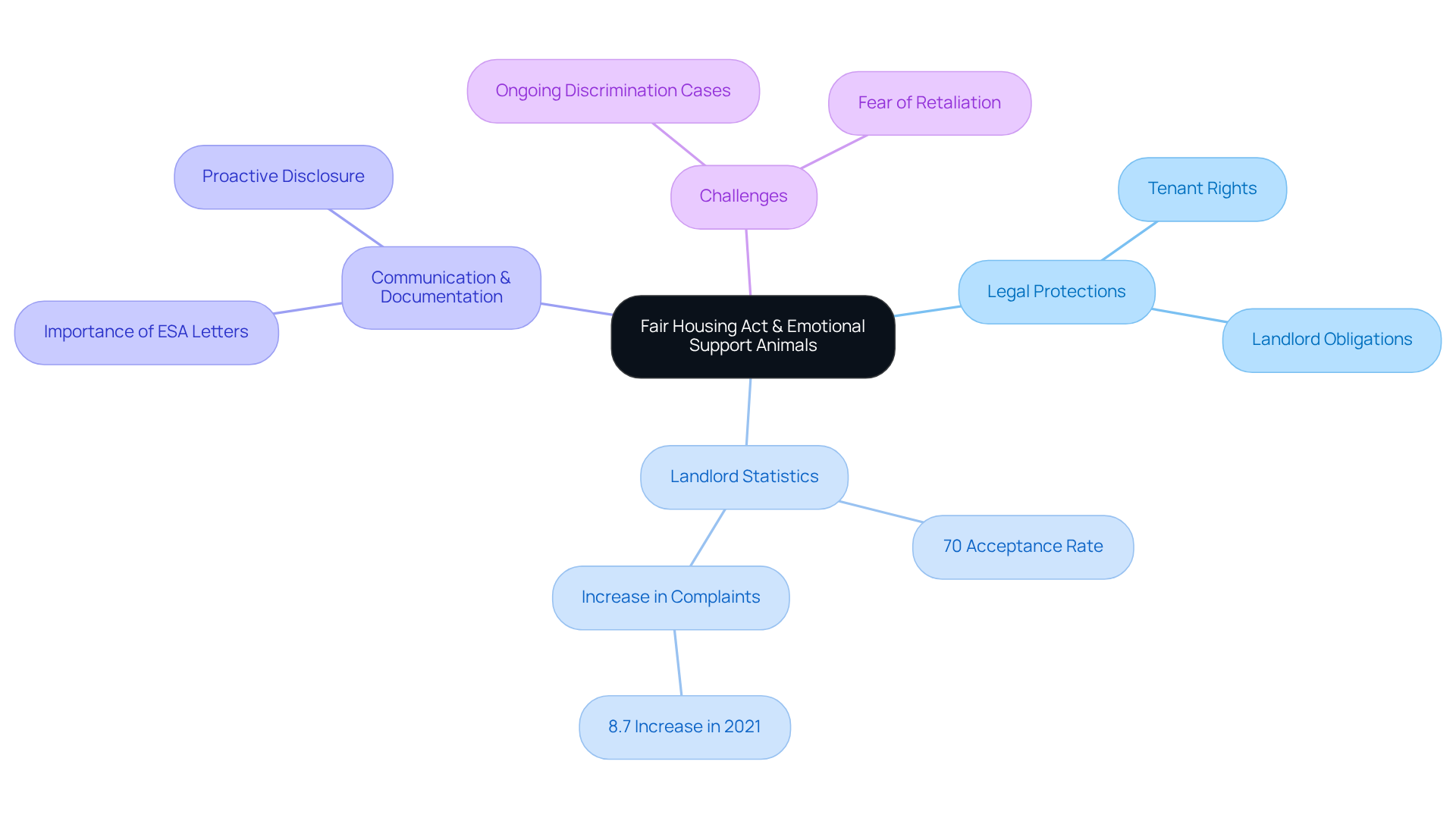
Service Animals vs. Emotional Support Animals: Key Differences in Michigan Law
In Michigan, understanding the difference between service animals and emotional support animals is crucial for pet owners, especially in relation to ESA laws Michigan. Service animals, specifically trained to assist individuals with disabilities, enjoy broader access privileges under the Americans with Disabilities Act (ADA). This means they can accompany their handlers in most public spaces, including restaurants and stores, providing essential support. Conversely, emotional support animals offer therapeutic benefits primarily through companionship, yet they lack the same public access rights. This discrepancy can lead to confusion for ESA owners about where their beloved companions are permitted to go.
Recent legal updates have shed light on these distinctions under ESA laws in Michigan, underscoring the importance for ESA owners to be aware of their rights and the limitations that apply to their pets. It’s important to recognize that public access privileges for service animals are significantly greater than those for emotional support animals, which are generally limited to housing situations under the Fair Housing Act.
Understanding these differences is vital for ESA owners to navigate their rights effectively under ESA laws Michigan and ensure compliance with Michigan law, fostering peace of mind as they seek the support they need.
Public Access Laws: What Michigan Allows for Emotional Support Animals
In Michigan, individuals facing emotional challenges often find that under ESA laws Michigan, emotional support animals (ESAs) do not have the same public access privileges as service animals. While service animals are allowed in all public areas, emotional support companions face limitations in places like restaurants, shops, and public transit unless specifically permitted by the establishment. This situation can be frustrating, highlighting the importance for pet owners to be well-informed about where their emotional support animals can accompany them. It’s essential to communicate clearly with public venues regarding their policies, as this understanding can alleviate some of the stress associated with navigating public spaces.
Recent statistics reveal that approximately 30% of public venues in Michigan adhere to ESA laws Michigan, indicating a growing awareness of the role of emotional support animals in supporting mental health. Establishments such as certain hotels, therapy centers, and some pet-friendly cafes often welcome emotional support animals. However, it is crucial for owners to verify each venue’s specific policies before visiting. This step not only ensures compliance but also fosters a more enjoyable experience for both the owner and their emotional support animal.
Comprehending these nuances can greatly improve the experience for individuals relying on their emotional support animals. By acknowledging the challenges and advocating for clear communication with public venues about ESA laws Michigan, we can create a more inclusive environment for those who benefit from the companionship of their ESAs. Remember, you are not alone in this journey; support is available, and understanding these subtleties can make a significant difference.
Landlord Regulations: Rights and Responsibilities for Emotional Support Animals
In Michigan, many individuals face emotional challenges that can significantly impact their daily lives. For those with mental health issues, the presence of emotional support animals (ESAs) can provide essential comfort and companionship. Fortunately, landlords are legally required to accommodate tenants under ESA laws Michigan when provided with a valid ESA letter. This requirement stems from the Fair Housing Act, which prohibits discrimination against individuals with disabilities. It’s reassuring to know that landlords cannot impose pet fees or deny housing based on the presence of an ESA, allowing those who need support to live with their companions without facing undue barriers. However, it’s important to remember that landlords can request documentation to verify the necessity of the animal, as long as they respect tenant privacy and avoid excessive inquiries.
While service dogs enjoy complete public access privileges under the Americans with Disabilities Act (ADA), emotional support animals do not share the same legal standing. Service dogs are trained to perform specific tasks for individuals with disabilities, granting them access to various public spaces such as restaurants, stores, and public transportation. In contrast, emotional support animals primarily provide emotional assistance and do not require specialized training, which affects their legal rights and access.
Recent statistics reveal that approximately 18% of pet owners in the U.S. have emotional support animals, underscoring the growing recognition of their importance in supporting mental health. Despite these protections, many renters in Michigan report experiencing discrimination related to their emotional support animals as outlined by ESA laws Michigan. Legal professionals emphasize the importance of understanding tenant entitlements and fostering clear communication between renters and property owners to promote successful relationships under ESA laws Michigan.
Successful tenant-landlord relationships often hinge on mutual respect and understanding of these entitlements. For example, landlords who take the initiative to educate themselves about ESA laws Michigan can cultivate a more inclusive environment, benefiting both parties. As noted by housing law experts, fostering open dialogue can help mitigate misunderstandings and enhance compliance with legal obligations.
In light of recent developments, advocacy groups are tirelessly pushing for stronger protections for ESA owners, ensuring that individuals can access the emotional support they need without fear of discrimination. This ongoing conversation is vital for improving tenant protections and ensuring fair housing opportunities for everyone. Together, we can create a supportive environment where emotional support animals can thrive alongside their owners.
Obtaining a Legitimate ESA Letter: Steps for Michigan Pet Owners
Navigating mental health challenges can be incredibly tough, and many individuals find solace in the companionship of Emotional Support Animals (ESAs). To obtain a legitimate ESA letter in Michigan, pet owners should follow these essential steps in accordance with ESA laws Michigan:
- Complete a brief assessment to determine eligibility.
- Schedule a consultation with a licensed mental health professional.
- Discuss the necessity of an ESA during the consultation.
- Receive the ESA letter if approved.
It’s crucial that this letter is issued by a licensed professional, as this ensures its validity and acceptance by landlords. In Michigan, ESA laws Michigan require that letters be signed by licensed healthcare providers, such as psychologists or medical doctors, to meet legal requirements.
ESAs play a vital role in alleviating symptoms related to mental health conditions, providing comfort and support to their owners. Imagine the relief of knowing that your furry friend can be there for you, helping you navigate through difficult times. Additionally, landlords are prohibited from imposing pet fees or deposits for emotional support creatures, strengthening the entitlements of ESA owners and guaranteeing equal access to housing.
The average cost of obtaining an ESA letter in accordance with esa laws michigan ranges from $149 to $200, depending on the provider. However, with Wellness Wag, you can start the process for as low as $32.25, thanks to our interest-free payment plans that allow you to divide your payment into four manageable installments. This economical method not only protects the interests of ESA owners but also reinforces the integrity of the support system for individuals experiencing mental health challenges. If you’re ready to take the next step towards finding the support you deserve, consider visiting Wellness Wag’s website for more information or to start your application.
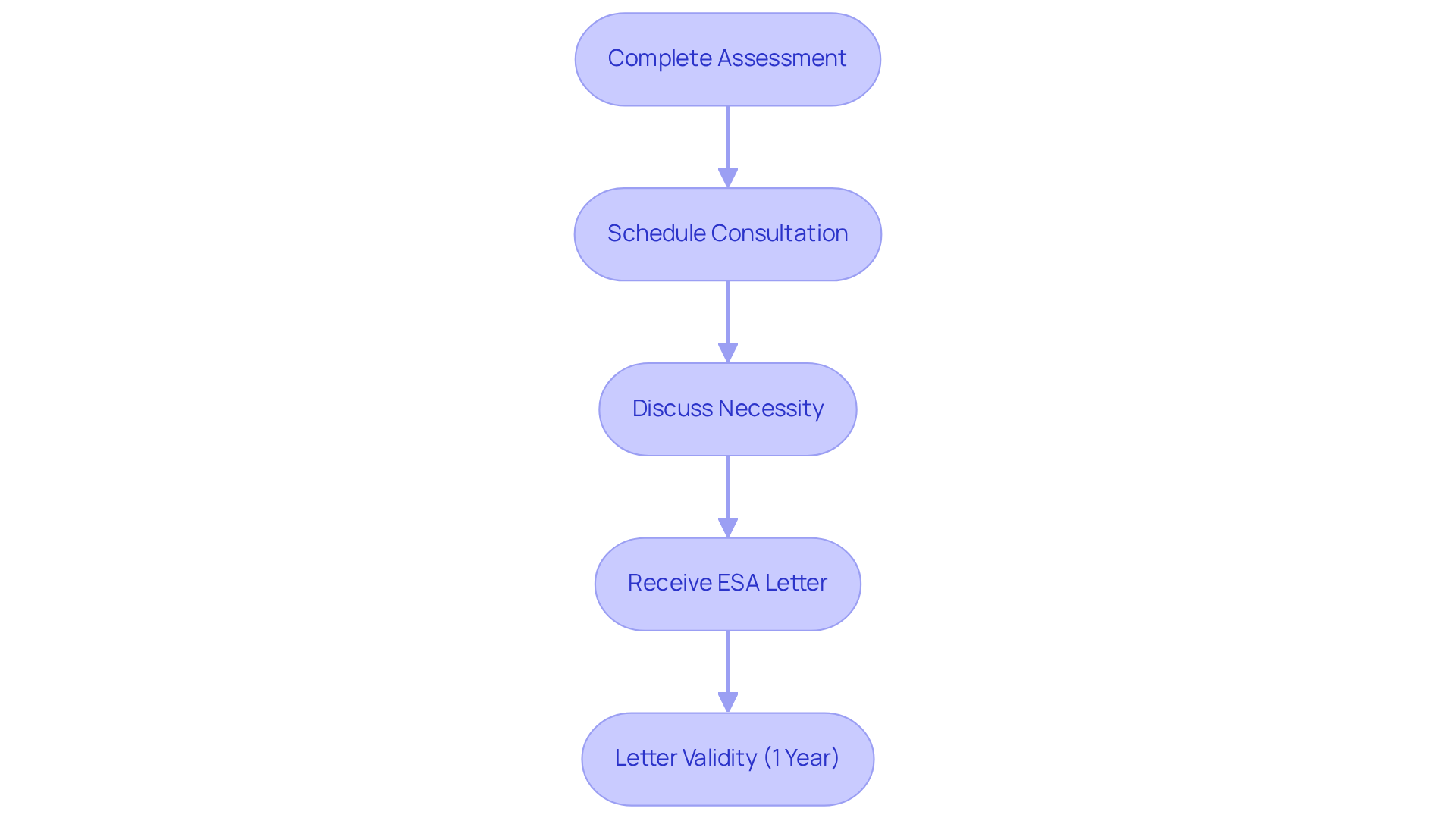
Legal Implications: Navigating ESA Rights in Michigan
Navigating the legal landscape of ESA laws in Michigan surrounding emotional support animals can be challenging, especially for those facing mental health issues. It’s essential for proprietors to understand their rights under the ESA laws in Michigan and the Fair Housing Act (FHA), which protects renters with emotional support animals from discrimination and mandates reasonable accommodations from landlords. Recent legal cases have underscored the importance of having valid ESA letters, as courts have affirmed that landlords cannot dismiss these letters without appropriate justification. This situation emphasizes the need for ESA owners to confidently assert their rights when faced with discrimination.
Moreover, it’s vital for pet owners to be aware of the limitations regarding public access for emotional support animals. Unlike service animals, emotional support animals do not have the same rights to enter public spaces, which can lead to potential legal conflicts. Therefore, ESA owners should keep their letters readily available and be prepared to discuss their rights with landlords and public establishments. Understanding these rights is crucial, especially considering that approximately 18% of pet owners in the U.S. classify their animals as ESAs, highlighting a growing need for awareness and support in this area.
Legal experts emphasize that possessing an authentic ESA letter from a licensed mental health professional is crucial for accessing protections under the ESA laws in Michigan. This documentation not only aids in securing housing accommodations but also empowers individuals to navigate challenges related to pet restrictions. As the legal framework evolves, staying informed about ESA rights and responsibilities will help pet owners maintain their emotional support connections without unnecessary barriers.
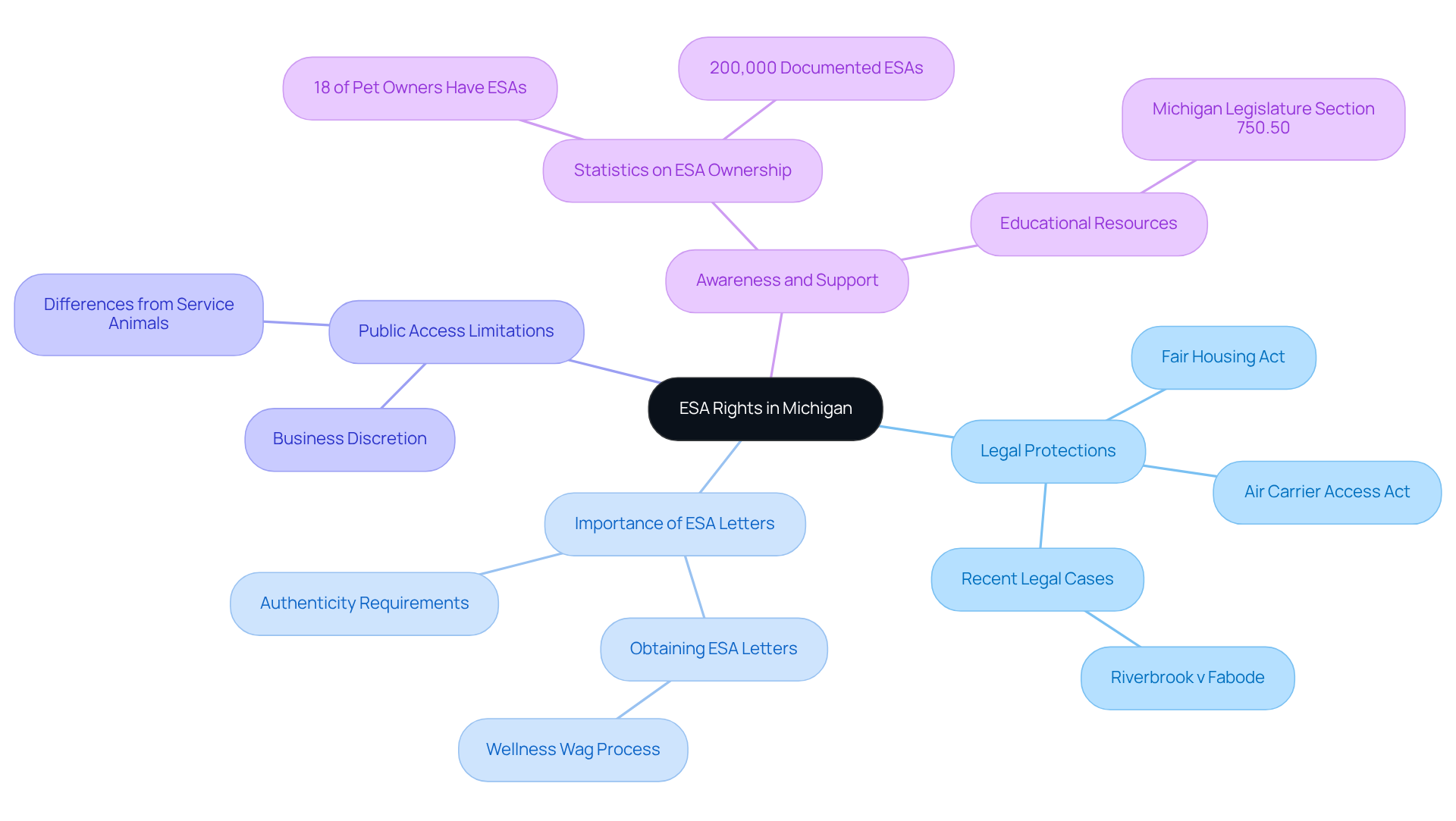
Landlord Fees and Restrictions: What to Expect with Emotional Support Animals
In Michigan, many individuals face emotional challenges that can be overwhelming. For those with mental health issues, the presence of an emotional support animal (ESA) can provide invaluable comfort and companionship.
It’s important to know that ESA laws in Michigan prohibit landlords from charging additional fees or deposits for emotional support animals. This legal framework ensures that tenants with valid letters under ESA laws in Michigan are exempt from pet-related charges, such as pet rent or deposits. However, landlords do retain the right to charge for any damages caused by the ESA.
Clear communication between tenants and landlords regarding these regulations is crucial to prevent misunderstandings and ensure compliance. Yet, despite these safeguards, a significant portion of landlords in Michigan still charge fees associated with emotional support animals, in violation of ESA laws in Michigan. This reality underscores the necessity for continual education and advocacy concerning these regulations.
Recent discussions among housing advocates highlight the importance of recognizing that while emotional support animals are safeguarded under the Fair Housing Act, landlords may still attempt to impose limitations based on specific situations.
Therefore, it’s essential for tenants to be prepared to present their ESA documentation and engage in open dialogue with their landlords. By fostering understanding and compassion, both parties can navigate these policies effectively, ensuring that the emotional support animals can continue to provide the comfort and companionship that so many individuals need.
Communicating with Landlords: Best Practices for ESA Disclosure
When reaching out to a landlord about an emotional support animal (ESA), it’s crucial to communicate with clarity and compassion. Tenants should promptly submit their ESA letter, sharing how the animal plays a vital role in their mental well-being. Emotional support animals provide essential assistance in alleviating symptoms associated with disabilities, making their presence incredibly important. It’s comforting to know that ESAs are allowed in university housing, ensuring that all students have the opportunity to fully enjoy their residential experience.
Keeping detailed records of all interactions and understanding one’s legal rights under the Fair Housing Act can greatly enhance this important dialogue. It’s also beneficial to approach the conversation with empathy, acknowledging that landlords may have genuine concerns about their property, such as potential damage or disturbances caused by the pet. By cultivating a respectful and understanding atmosphere, tenants can encourage a more positive response to their ESA needs.
Moreover, research shows that a significant percentage of requests under ESA laws in Michigan lead to landlord approval when communicated effectively. This reinforces the importance of sharing one’s story with clarity and compassion, highlighting the supportive role that ESAs can play in enhancing mental health and overall well-being.
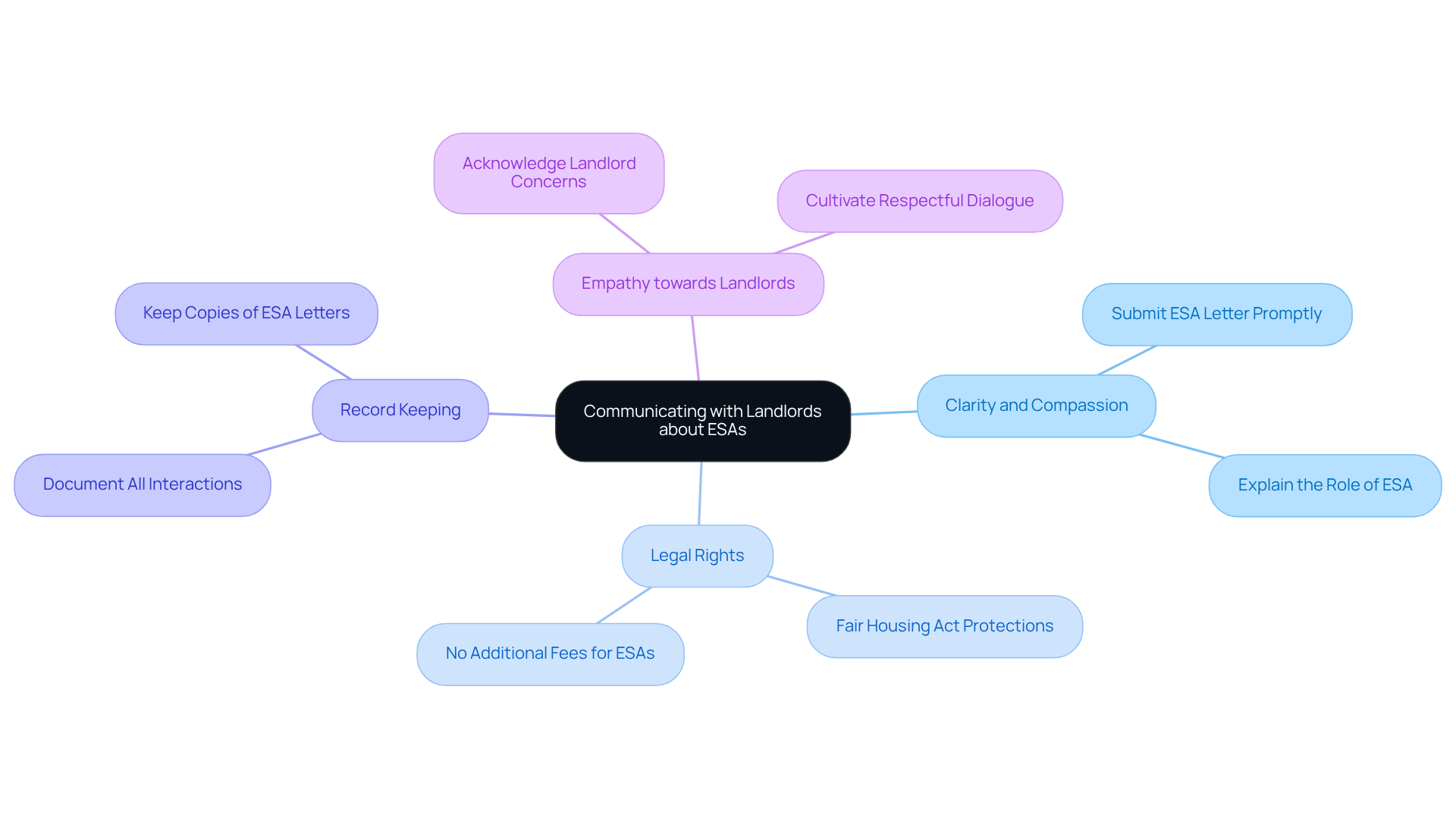
Overview of Michigan ESA Laws: Essential Knowledge for Pet Owners
The ESA laws in Michigan are primarily guided by federal regulations, notably the Fair Housing Act (FHA), which provides crucial protections for individuals with disabilities. While the state lacks specific ESA laws in Michigan dedicated to ESAs, the FHA requires that ESA owners possess a valid ESA letter from a licensed mental health professional. This documentation is essential for ensuring that their entitlements are recognized in housing situations, allowing them to live with their emotional support animals even in pet-restricted accommodations.
Many individuals face emotional challenges that can feel overwhelming. Recent surveys indicate that about 70% of Michigan residents are aware of ESA laws and their entitlements, highlighting the importance of education in this area. Legal professionals stress that understanding these regulations is critical for pet owners to effectively advocate for their rights. One lawyer noted, “Understanding ESA laws enables individuals to guarantee their emotional support companions are accommodated in housing situations.”
It’s vital to distinguish between emotional support animals and service dogs. While service dogs are specifically trained to perform tasks for individuals with disabilities, ESAs provide comfort and emotional support but do not have the same access privileges under the law. This distinction can be crucial for those seeking the companionship and comfort that ESAs offer.
There are numerous examples of ESA owners successfully advocating for their rights under Michigan law. Many have navigated housing disputes by presenting their ESA letters, which serve as a legal basis for their requests. This proactive approach not only fortifies their rights but also underscores the essential role that emotional support companions play in enhancing mental health and well-being.
Wellness Wag, for instance, provides a streamlined online process for obtaining ESA letters within 24 hours. This ensures that pet owners can quickly secure the necessary documentation to support their needs. Furthermore, Wellness Wag is dedicated to maintaining client privacy and complies with HIPAA regulations, ensuring that all health information is handled with the utmost care. If you have questions or concerns about this Privacy Policy, please reach out to us by sending an email to [email protected].
In summary, while ESA laws in Michigan do not specifically govern ESAs, the protections offered by the FHA are significant. Pet owners must be equipped with the necessary knowledge and documentation to ensure their emotional support animals are recognized and accommodated in their living environments. We encourage pet owners to seek out ESA letters and familiarize themselves with their rights under the FHA, as this can be a vital step toward ensuring they receive the support they need.
Conclusion
Navigating the complexities of ESA laws in Michigan can be a daunting journey for pet owners seeking the support of Emotional Support Animals. It’s essential to understand these regulations, as they empower individuals to advocate for their rights and ensure they maintain the vital companionship of their ESAs in various living situations. The Fair Housing Act offers a protective framework that allows tenants with valid ESA letters to secure housing without facing discrimination. This highlights the importance of proper documentation and open communication with landlords.
Throughout this article, we’ve explored the distinctions between emotional support animals and service animals, the legal protections provided by the Fair Housing Act, and the rights and responsibilities of both tenants and landlords. It’s crucial to obtain a legitimate ESA letter, as well as for landlords to understand their role in accommodating ESAs. Clear communication is key to preventing misunderstandings, fostering a supportive environment for those relying on emotional support animals.
As the conversation around emotional support animals evolves, staying informed about rights and the legal landscape surrounding ESAs is vital for Michigan residents. By proactively understanding these laws and advocating for their needs, pet owners can ensure they receive the emotional support necessary for their well-being. Resources like Wellness Wag can help streamline the process of obtaining an ESA letter, making it easier to navigate the challenges associated with housing and emotional support needs. Remember, you are not alone in this journey; support is available, and your well-being matters.
Frequently Asked Questions
What services does Wellness Wag provide for Michigan residents?
Wellness Wag offers a user-friendly platform to help Michigan residents obtain their Emotional Support Animal (ESA) letters, providing compassionate support during their journey towards mental well-being.
How does the process of obtaining an ESA letter through Wellness Wag work?
The process begins with a brief assessment to determine eligibility and specific emotional support needs. After assessment, individuals are connected with licensed medical professionals for personalized consultations. Once an order is placed, a confirmation email is sent, and after approval, the official ESA letter is typically received within 24 hours.
What legal protections does the Fair Housing Act provide for individuals with ESAs?
The Fair Housing Act (FHA) protects individuals with disabilities, including those with Emotional Support Animals, by requiring landlords to provide reasonable accommodations for tenants with valid ESA letters, allowing them to live with their animals even in properties where pets are typically not allowed.
What is the current attitude of landlords in Michigan towards ESAs?
Approximately 70% of landlords in Michigan are willing to accept tenants with Emotional Support Animals, provided they have the necessary documentation, reflecting a growing awareness of their legal obligations under the FHA.
What challenges do ESA owners face in securing housing?
ESA owners may encounter challenges such as housing discrimination, as evidenced by an increase in grievances related to ESA discrimination in 2021. Clear communication and proper documentation are essential for successfully securing housing.
What are the key differences between service animals and emotional support animals in Michigan?
Service animals are specifically trained to assist individuals with disabilities and have broader access rights under the Americans with Disabilities Act (ADA), allowing them to accompany their handlers in most public spaces. In contrast, emotional support animals provide therapeutic benefits through companionship but lack the same public access rights and are primarily covered under housing situations by the Fair Housing Act.
Why is it important for ESA owners to understand their rights under the FHA?
Understanding their rights helps ESA owners navigate housing complexities effectively, ensuring they can advocate for their entitlements and foster a more inclusive housing environment. It is crucial for renters to disclose their emotional support animals to property owners and ensure all required documentation is in order.
Certify Your Emotional Support Animal Today

Why You Can Rely on Us?
At Wellness Wag, we believe your pet deserves care rooted in both science and compassion. Each article is carefully researched, written in clear language for pet owners, and then reviewed by qualified professionals to ensure the information is evidence-based, current, and practical for real-life care. Our goal is to help you feel confident in making informed decisions about your pet’s health and well-being.
Reviewed by
Angela Morris, MSW, LCSW
Angela is a licensed clinical social worker with 20 years of experience in patient advocacy and community mental health. She has assisted numerous clients with ESA evaluations and brings a deep understanding of disability accommodations, ensuring that all information is accurate, supportive, and practical.

Written by :
Lena Park
Last Updated :
July 9, 2025












